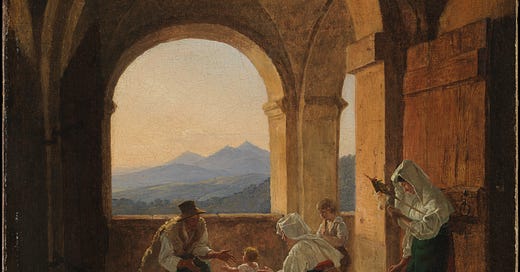I understand my mother now That you are here and she is gone I share with her our parent’s loss I deeply wish that you will not You would have loved her son I know But we will never get to see Her pick you up and hold you close Both looking back to laugh at me This warm-wind anemoia wafts Through dusty corners in my dreams Then I wake to see you smiling there; Moments beautiful and bittersweet. - - N. C-J, 2024
This poem is inspired/influenced by Philip Larkin’s This Be The Verse. This classic and oft-quoted poem was burned into my mind by the first community college professor of poetry I had, who had us yelling it out in unison in the first week of class! It certainly has a reputation, for better or worse.
I do really enjoy the dramatic turn Larkin’s third stanza — the shift from expletives and plain exposition on his point is abrupt and moving. He really distills all his feelings about the subject into the brief couplet, before making another funny to emphasize and yet somehow distract from the seriousness of what he’s saying. I attempted to mimic the same structure in my own poem, with a shifting in the third stanza from explaining reality to describing feeling.
Regarding the broader point Larkin is making: he may not be completely wrong (parents do pass on the bad and good to their children, and for some this could be more bad and less good), but it is certainly cowardly. Does he really think that there is no possible way adults could be good parents? Of course, this is assuming that he is dead serious here (I get some tongue-in-cheek vibes as well).
It could just as easily be a challenge to those couples who are waiting for the perfect moment. Perhaps with the last line he’s saying if you aren’t willing to admit that messing up your kids is to some extent inevitable, you might as well end it all so you don’t have any kids! If you are going to be a perfectionist/life optimizer extremist, then you might as well just avoid the situation entirely; just hurry up and die if you want an un-messy life... Those aren’t really a thing.
Of course, he may be being completely sincere in his sentiments, in which case the poem isn’t confusing at all and can be read very simply and straight up. Another reason why it’s popular.
My own poem references one of the moments in which many of us experience the opportunity to pass on the faults we had (and any extras). That is, the death of our parents. My mother herself experienced this as her father died suddenly and unexpectedly in her late 20s. The residue from the way she dealt with his death throughout her life echoed intermittently when she got married, when I was born, and into her twilight years. Frankly, it seems clear in hindsight that she did pass on the melancholia of her unfelt emotions onto me, the namesake of her father. Now I too know something of what she felt, as I raise my own son who will never meet her. I join that long and storied line of those who have lost parents. The ongoing grief of it happening so suddenly could freeze me, put up walls between my son and I. I have the opportunity to live in the Hour of Lead, as Dickinson puts it. But, I must not. I, and we all, can somehow become people who fully experience grief and the entire range of emotions so we can be fully present with those around us, most importantly our family and children. This requires looking fully into the face of them to parse the nuance; that is, exploring the emotional Frontier.
A note on the word anemoia, which was coined in the recent interesting book "Dictionary of Obscure Sorrows”, by John Koenig. Anemoia is the wishing for time or a place one has never known. The book is an interesting compilation of words both coined by him and others from elsewhere in popular culture. The aim being to provide English with more descriptions of emotion-words. We like thinking about popular untranslatable loan-words like hygge, or schadenfreude, so I appreciate Koenig’s work on bringing these types into English. Anemoia in particular came from the idea of the greek word for wind, which worked well with how I wanted to end the poem. This poem is an edited version of the original, posted it in the inaugural newsletter in February.





